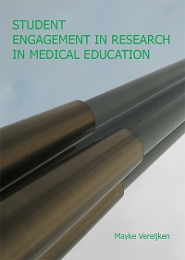
Importance of research in medical education
Doctors are expected to apply recent insights from research to improve patient care. This is one of the reasons for integrating research into medical education. Mayke Vereijken (ICLON) concludes in her thesis that students experience engagement in research in different ways in their education. Defence on May 22, 2018.

From earlier studies in higher education, we know that both the way in which lecturers involve students in learning activities, and the way in which students perceive the learning environment influence learning. Student perceptions of research and opinions about learning and research could also change during the course.
Enhancing student engagement with research
The study programme can promote different aspects of student engagement in research in medical education, namely
- critical reflection on research findings;
- taking note of the research of teachers;
- student motivation for research;
- student participation in research;
- research-related learning outcomes such as student products and test scores on national progress tests in the medical scientific research domain.
A good curriculum design that supports coherence between different research practices can increase the involvement of students. For example, through learning activities in which students integrate their experiences with research in education and their views on the relevance of research during their studies.
Enhancing learning
Students seem to find research in education particularly stimulating for their own learning process, and less for medical professional practice. That is why relationships between research, education and patient care have to be made clear, both in the education of students and in medical follow-up courses.
Prior to the PhD defence of Mayke Vereijken, a seminar is held on research-based education and student involvement.
